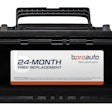Diesel engine oil additives are popular add-on layers of protection, but many of their cornerstone benefits are already engineered into base lubricants.
Brian Humphrey, OEM technical liaison for Petro-Canada Lubricants, says oil additives can make up between 10 and 20 percent of a heavy-duty lubricant that has been validated to engine OEM-approved standards.
“Adding additional [aftermarket] additives to an engine oil could unbalance the additive system, resulting in detrimental side effects and potentially invalidating the engine manufacturer’s warranty,” he says.
Before selecting or adding a supplemental additive, Bell Performance Technical Sales Director Erik Bjornstad says it’s important to understand the level of protection already provided by standard oil “to avoid getting suckered into buying something that you don’t really need.”
Bjornstad says current generation advanced oils already contain viscosity modifiers, anti-oxidants, dispersants, acid neutralizers, anti-wear agents and detergents.
“Over the life of the oil, some of these get used up. Part of the reason to change the oil is that the oil has lost the protective aspect of whatever the given additive component was imparting to it, so you need to replenish that by changing out the old oil for fresh oil with a fresh set of additives,” he says. “The value for using an oil additive would be whether it contains these kind of components that would be replenished, improving or extending the protecting of the oil.”
Shell Lubricants Global OEM Technical Manager of Dan Arcy, noting the company spends “millions and millions of dollars” on oil formulation, development and testing, says Shell Rotella doesn’t recommend adding additives off-the-shelf to its products.
“We don’t test [engine oil] with any other additives in them other than the ones we put in that we have designed specifically for our products,” he says. “Once you add something else to it, I can’t tell you what’s going to happen. [But] when it comes to supplemental additives, I always say it’s a customer’s choice.”
For fleets in the market for supplemental options, Bjornstad suggests seeking additives that improve the oil’s key abilities to protect in the areas where it’s already engineered to provide protection.
“I always say that petroleum chemists and automotive engineers are really smart people who know what is and is not needed,” he says. “Oil already comes with additives in it to do certain things, so the consumer should piggyback off that knowledge and lean towards oil additives to provide extra improvement in those areas.”
Humphrey says the additive package of a heavy duty engine oil is a careful balancing act, with chemicals combined in specific quantities to create a properly formulated lubricant. The indiscriminate addition off-the-shelf products could be disruptive to the formulations properties.
“The balance of the formulation is critical,” he says. “More is not always better, and each individual additive can affect the oil and therefore the engine’s performance.”
In evaluating an oil additive, Bjornstad suggests looking closely at what it claims to do and determine if it contains the kind of components that would fulfill those claims.
“Something that is simply a viscosity modifier or oil thickener isn’t going to do anything worthwhile that a driver would want to spend money on. The driver should be most concerned with enhancing the protective properties of the oil that it already contains additives to assist with,” he says. “The antioxidant and acid neutralization and particulate dispersing properties of the oil are just as important as any perceived benefit that comes from some claim to strengthen the oil film.”
Additives are also not a suitable replacement for regular maintenance and shouldn’t be viewed as a fix for problems like heavy smoke or high oil consumption rates – both indicators of larger engine issues.
“The driver should know what normal engine behavior and normal oil usage patterns are for their equipment. If the engine is using an excessive amount of oil, they would not want to seek out an oil additive to bring that back into line,” Bjornstad says. “Doing so would be a bad idea because the engine’s oil consumption has increased due to a mechanical issue in the engine. No oil additive is going to fix that kind of thing, of course.”










